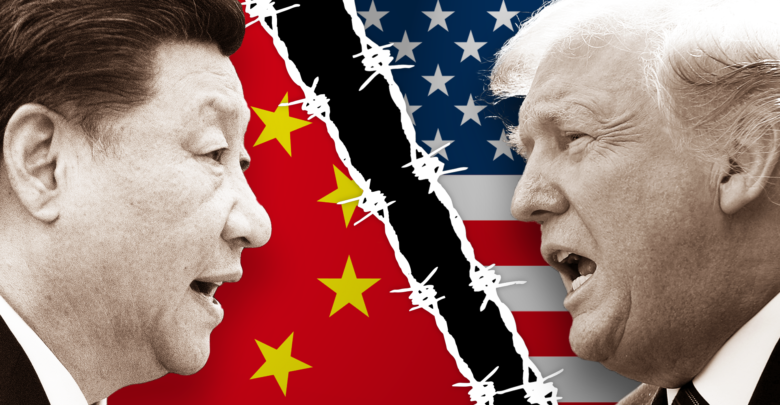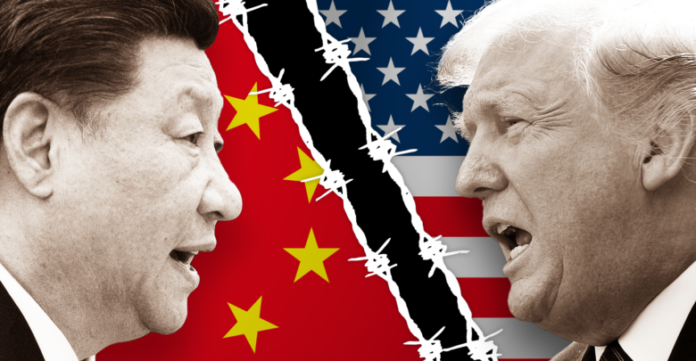INTERVIEW WITH | INTERVISTA A
S.N. JAFFE
Because tensions are set to rise between a rising power (China) and the power that threatens to supplant (the United States)

Perché sono destinate a crescere le tensioni tra un potere in ascesa (la Cina) e il potere che minaccia di soppiantare (gli Stati Uniti)
S.N. Jaffe is an Assistant Professor of Political Science and International Affairs at John Cabot University in Rome and the author of Thucydides on the Outbreak of War: Character and Contest (Oxford University Press 2017). He has taught Political Theory and International Relations at Bowdoin College, the University of Toronto, and John Cabot University. The translation from English to Italian is by Lorenza De Carolis.
S.N. Jaffe è Assistant Professor di Scienze Politiche e Affari Internazionali presso la John Cabot University di Roma e l’autore di Thucydides on the Outbreak of War: Character and Contest (Oxford University Press 2017). Ha insegnato Teoria politica e relazioni internazionali al Bowdoin College, all’Università di Toronto e alla John Cabot University. La traduzione dall’inglese è di Lorenza De Carolis

SUDeFUTURI MG | What is the “Thucydides Trap”, and why does it matter?
SETH JAFFE | The Thucydides Trap is a 2012 coinage of the Harvard political scientist Graham Allison, who argues that America and China are closer to serious conflict than observers and policymakers recognize. Drawing from the ancient Athenian historian Thucydides, who wrote about the great Peloponnesian war between Athens and Sparta (431 – 404 BC), Allison maintains that Thucydides articulated a profound teaching about the origins of great power war, which is currently applicable to the evolving U.S. China relationship. In 2017, he expanded upon his argument in the bestseller, Destined for War: Can America and China Escape Thucydides’s Trap? Importantly, his arguments have become more than mere academic ones. President Xi Jinping of China has referenced the Thucydides Trap, while Allison himself has briefed members of Trump’s National Security Council. Indeed, the increasingly fraught relationship between the United States and China has given credence to Allison’s claims in the minds of many observers.
SUDeFUTURI MG | Cos’è la “Trappola di Tucidide” e perché oggi è così rilevante nello scacchiere internazionale?
SETH JAFFE | La trappola di Tucidide è un neologismo coniato nel 2012 dal politologo di Harvard Graham Allison, il quale sostiene che l’America e la Cina si trovano vicine alla possibilità di un conflitto più concreto di quanto gli osservatori e i decisori politici riconoscano. Ispirandosi all’antico storico ateniese che scrisse della guerra del Peloponneso tra Atene e Sparta (431-404 a.C.), Allison sposa il profondo insegnamento che Tucidide articolò sulle origini della grande guerra di potere ritenendolo applicabile all’ odierna situazione dei rapporti in continua evoluzione tra Stati Uniti e Cina. Nel 2017, ha approfondito la sua tesi nel best-seller, “Destinati alla guerra: Possono l’America e la Cina sfuggire alla trappola di Tucidide?”. È importante sottolineare che le sue argomentazioni sono divenute più che semplici tematiche accademiche. Lo stesso presidente cinese Xi Jinping ha fatto riferimento alla Trappola di Tucidide ed Allison ha sensibilizzato sul tema i membri del Consiglio di Sicurezza Nazionale del presidente Trump. In effetti, il sempre più teso rapporto tra gli Stati Uniti e la Cina ha dato credito alle affermazioni di Allison nella mente di molti osservatori.
SUDeFUTURI MG | As an expert on Thucydides but also a student of American foreign policy, what do you think of the Thucydides Trap concept?
SETH JAFFE | Thucydides famously describes the origins of the Peloponnesian war in the following way, “it was the growth of the power of Athens, and the alarm (or fear) which this inspired in Sparta, which made war (somehow) inevitable … or necessary or compulsory.” As others have done before him, Allison has interpreted this striking sentence as a timeless statement about how structural shifts in the balance of power lead to a significantly increased risk of war. In other words, inevitable tensions will develop between a rising or revisionist power (China, in this case) and the status quo or maintaining power it threatens to displace (here, the United States).
My own view is that Thucydides’ account is not merely or simply a structural one. Importantly, it is also bound up with the way the actors, Athens and Sparta, came to understand the imperatives of their national interests. In other words, war or conflict became “inevitable” when the actors themselves saw no alternative to it, while their respective visions of their national interests were shaped by structural alterations in the balance of power. Thucydides, in other words, connects structural or material changes with how political actors perceive their interests. His view is not a deterministic one.
Lastly, I do believe that there are implications for the contemporary U.S. – China relationship. Hardening attitudes on both sides not only invite conflict but may lead to escalation in the event of it. Stated differently, the more inflexible the positions of American and Chinese leaders, the greater the risk that a minor spark could trigger a major conflagration.
SUDeFUTURI MG | Da esperto di Tucidide ma anche studioso di politica estera americana, come ci illustra il concetto di Trappola di Tucidide?
SETH JAFFE | Tucidide descrive notoriamente le origini della guerra del Peloponneso nel modo seguente: “quello che rese il conflitto (in qualche modo) inevitabile … o necessario, fu la crescita del potere di Atene e la paura che questa creò a Sparta”. Come altri prima di lui, Allison ha interpretato questa sorprendente frase come un’affermazione, senza tempo, su come i cambiamenti strutturali nell’equilibrio del potere conducano ad un rischio di guerra significativamente maggiore. In altre parole, si svilupperanno inevitabili tensioni tra un potere in ascesa o revisionista (la Cina, in questo caso) e lo status quo o il mantenimento del potere che minaccia di soppiantare (gli Stati Uniti).
La visione di Tucidide, a mio avviso, non riguarda semplicemente cambiamenti di tipo strutturale ma è soprattutto legata al modo in cui gli attori dell’epoca, Atene e Sparta, arrivarono a comprendere gli imperativi dei loro interessi nazionali. La guerra del Peloponneso divenne “inevitabile” quando gli attori stessi non videro più alternative ad esso, mentre le rispettive visioni degli interessi nazionali erano ormai modellate da alterazioni strutturali nell’equilibrio di potere. Tucidide, in altre parole, collegò i cambiamenti architettonico-strutturali o materiali con il modo in cui gli attori politici percepirono i loro interessi. A tal proposito, il suo punto di vista non fu, e non è, di tipo deterministico.
Credo che questa interpretazione connoti perfettamente l’attuale relazione tra Stati Uniti e Cina. Atteggiamenti sempre più severi da entrambe le parti non solo invitano al conflitto, ma possono portare ad una degenerazione imprevedibile di esso. Detto in modo diverso, più inflessibili sono le posizioni dei leader americani e cinesi, maggiore è il rischio che una piccola scintilla possa innescare una inimmaginabile deflagrazione.
SUDeFUTURI MG | How would you describe the current U.S. – China Relationship?
SETH JAFFE | It is worsening. The overall relationship spans almost too many dimensions to count, but the Trump administration has been more overtly combative, especially on trade, than the Obama administration. At the same time, one of Obama’s signature economic policies — the Trans-Pacific Partnership (TPP) – was partially geared toward hemming in China’s economic influence, while Obama himself initiated a rebalancing toward the Pacific. Trump, for his part, withdrew America from the TPP, but he has nonetheless initiated an ongoing and acrimonious trade war with China.
These growing tensions, which have only been exacerbated by the COVID-19 blame-game, have increasingly led American and Chinese scholars and policymakers to reevaluate the bilateral relationship. My sense is that hawks on both sides are winning, while the doves are losing credibility. Some are even describing the situation as a Cold War 2.0. Mike Pompeo, the American Secretary of State, recently delivered a speech (July 23, 2020), entitled “Communist China and the Free World’s Future,” where he indicated that the Chinese Communist Party must be “induced to change” because “Whatever the reason … today China is increasingly authoritarian at home, and more aggressive in its hostility to freedom everywhere else.” Pompeo’s framing suggests an irreconcilable tension between the values and interests of free societies and those of authoritarian regimes. Under Xi Jinping, China has moreover become increasingly assertive, which is likely to continue. His China Dream agenda is geared toward leading China out of its “Century of Humiliation” into a new period of national rejuvenation and strength.
In other words, the attitudes of the countries are opposed and hardening, while the rhetoric is becoming heated. This increases the risk of clashing interests but also of misunderstandings, all of which invite conflict. There are various potential flashpoints, but I remain most concerned about close naval encounters between American and Chinese vessels in the South China during American Freedom of Navigation Operations (FONOPs).
SUDeFUTURI MG | Come descriverebbe le attuali relazioni tra Stati Uniti e Cina?
SETH JAFFE | In peggioramento. Il rapporto tra Stati Uniti e Cina, nella sua complessità, coinvolge quasi troppi aspetti e l’amministrazione Trump è stata espressamente più combattiva, soprattutto sul commercio, rispetto all’amministrazione Obama. Allo stesso tempo, una delle politiche economiche distintive di Obama – la Trans-Pacific Partnership (TPP) – è stata in parte orientata a limitare l’influenza economica della Cina al fine di intraprendere una riequilibratura verso il Pacifico. Ciononostante, Trump, per parte sua, ha ritirato l’America dalla TPP, generando quindi un inasprimento commerciale con la Cina.
Queste crescenti tensioni, che sono state solo esacerbate dal gioco di responsabilità in merito al COVID-19, hanno sempre più portato gli studiosi e i politologi americani e cinesi a rivalutare il rapporto bilaterale. La mia opinione è che “i falchi” di entrambe le parti stiano vincendo, mentre “i polli” perderanno automaticamente di credibilità. Alcuni addirittura descrivono l’attuale situazione come una Guerra Fredda 2.0. Il Segretario di Stato americano, Mike Pompeo, ha recentemente pronunciato un discorso (23 luglio 2020), dal titolo “La Cina comunista e il futuro del mondo libero”, suggerendo come il Partito comunista cinese debba essere “indotto a cambiare” perché “Qualunque sia la ragione … la Cina oggi si rivela sempre più autoritaria in patria ed ovunque più aggressiva nella sua ostilità alla libertà”. L’analisi di Pompeo denota una tensione inconciliabile tra i valori e gli interessi delle società libere e quelli dei regimi autoritari. Con Xi Jinping, la Cina è diventata e probabilmente continuerà a mostrarsi oltretutto sempre più determinata nella propria visione. Il suo programma China Dream è altresì orientato a condurre la Cina fuori dal suo “Secolo di umiliazione” e verso un nuovo periodo di ringiovanimento e nuova potenza nazionale.
Detto in altre parole, mentre gli atteggiamenti dei paesi si oppongono e si irrigidiscono, anche la retorica si acuisce. Questo agonismo aumenta non solo il rischio di conflitti di interesse ma anche di generare fraintendimenti in grado di scatenare un conflitto. Esistono diversi potenziali punti di rottura ma sono personalmente più preoccupato per il riposizionamento delle flotte americane e cinesi nel Mar Cinese meridionale durante le operazioni per la libertà di navigazione (FONOP) da parte del governo degli Stati Uniti.
SUDeFUTURI MG | How does Europe fit into the U.S. – China competition? What role does Russia play?
SETH JAFFE | The Europe – China relationship will be an extremely important one to watch in the coming years. Increasingly, Europe is wary of China’s intentions and concerned by its human rights abuses. Yet Europe is also profoundly aware of the importance of engaging China, especially in the economic sphere. At the same time, in the context of Brexit, immigration management, rising populism, economic divisions between North and South, cultural differences between East and West, and the increasingly fragile Transatlantic relationship, Europe is facing an identity crisis. The next ten years could be a moment where Europe articulates a truly “European” foreign policy, which would include a coherent posture toward China. Alternatively (and I fear more likely), it may be a period where an increasingly divided Europe fails to find the requisite unity to shape global events. Russia, for its part, will likely continue to play the role of spoiler, a destabilizing actor that thrives upon European and American disunity, which allows it free reign to pursue its interests.
SUDeFUTURI MG | Come si inserisce l’Europa nell’antagonismo tra Stati Uniti e Cina? Che ruolo gioca la Russia?
SETH JAFFE | La relazione Europa – Cina sarà da considerarsi di estrema importanza nei prossimi anni. L’Europa mostra sempre più cautela nei confronti delle intenzioni della Cina nonché preoccupazione circa le violazioni dei diritti umani di quest’ultima. Tuttavia, l’Europa è anche profondamente consapevole dell’importanza del coinvolgimento della Cina, soprattutto nella sfera economica. Allo stesso tempo però si trova ad affrontare una crisi di identità generata dal nuovo scenario in termini di Brexit, gestione dell’immigrazione, populismo in aumento, divario economico tra Nord e Sud, differenze culturali tra Est e Ovest e relazioni transatlantiche sempre più fragili. I prossimi dieci anni potrebbero essere un’occasione in cui l’Europa articoli una vera politica estera “europea”, che includerebbe un’omogenea posizione di vedute nei confronti della Cina. Alternativamente (e temo cosa più probabile), risulterebbe in un periodo in cui una sempre più divisa Europa potrebbe non contare sull’unità necessaria ad influenzare gli eventi globali. La Russia, da parte sua, continuerà probabilmente a svolgere il ruolo di attore destabilizzante che prospera sui disaccordi europei e americani, consentendole campo libero nel perseguimento dei propri interessi.
SUDeFUTURI MG | Is it possible for Italy, a strategic ally of America, to maintain an equidistant role in economic relations between American and China? Or will it be forced to align itself with American politics?
SETH JAFFE | In my view, the longer-term question is actually the extent to which Europe itself will bend toward China. In 2019, Italy became the first major European country to formally join the Belt and Road initiative, which is significant, though there have since been tensions. China has also invested heavily in Greece. As China becomes increasingly economically entangled with Europe, it will become more difficult, although not impossible, for Europe to challenge China’s preferred policies. Here, I think much may depend upon whether Donald Trump wins a second term as the American President. If he does, NATO is at serious risk, and so too any stable or coordinated relationship between America and Europe. A Biden victory, by contrast, would lead to the reestablishment of America’s decades long collaboration with Europe, including, presumably, a new common cause against Russia as well as China. In this context, it is worth noting that Biden, too, has offered strong words about China. Regardless of whether Trump or Biden wins the American election, I fear that the U.S. – China relationship will be contentious for the foreseeable future.
SUDeFUTURI MG | È possibile per l’Italia, alleata strategica dell’America, mantenere una posizione equidistante nelle relazioni economiche tra America e Cina? O sarà costretta ad allinearsi alla politica americana?
SETH JAFFE | A mio avviso, la lunga questione risiede nella misura in cui l’Europa rivolgerà la sua attenzione sempre più verso la Cina. Nel 2019, l’Italia è diventata il primo grande paese europeo ad aderire formalmente all’iniziativa Belt and Road, il che è significativo, nonostante qualche situazione di attrito. La Cina ha anche fortemente investito in Grecia. Man mano che la Cina diventa sempre più coinvolta economicamente con l’Europa, diventerà più difficile, sebbene non impossibile, per l’Europa sfidare le politiche che la Cina privilegia. Penso che molto dipenderà dell’esito delle elezioni alla presidenza americana. In caso di vittoria per Donald Trump, la NATO sarà a serio rischio e così anche qualsiasi relazione solida o coordinata tra America ed Europa. Una vittoria di Biden, al contrario, porterebbe al ristabilimento della collaborazione decennale dell’America con l’Europa, inclusa, presumibilmente, una nuova causa comune contro Russia e Cina. A tal proposito, vale la pena notare che anche lo stesso Biden non ha risparmiato parole forti sulla Cina. Indipendentemente da chi vincerà le presidenziali americane, temo che le relazioni tra Stati Uniti e Cina saranno controverse per il prossimo futuro.
SUDeFUTURI MG | Is there a single Thucydidean teaching that you think is especially relevant today?
SETH JAFFE | It important to note that while Thucydides was a remarkably astute observer of human events, no Thucydides will solve today’s problems for us. We must do that. At the same time, Allison’s exhortation for U.S. and Chinese policymakers to treat the bilateral relationship with great care is a salutary one.
In my own view, one of Thucydides’ teaching of perennial importance is his belief that leaders characteristically overestimate the extent to which they have control over events. He thus enjoins his politically minded readers to avoid those circumstances where events can easily take on a dangerous life of their own. We have less control than we think, and so we must safeguard that flexibility which allows us to maneuver. I think that is a helpful message for our moment.
SUDeFUTURI MG | Quale aspetto dell’insegnamento di Tucidide ritiene particolarmente pertinente oggi?
SETH JAFFE | È importante notare che Tucidide era un osservatore straordinariamente acuto degli eventi umani, ma nessun Tucidide risolverà i problemi attuali. Dobbiamo essere noi a farlo. Allo stesso tempo, l’invito di Allison ai politici statunitensi e cinesi a trattare le relazioni bilaterali con grande attenzione è assolutamente benefico.
A mio avviso, uno degli insegnamenti di perenne importanza di Tucidide è la sua convinzione che i leader tipicamente sovrastimino la misura del loro controllo sugli eventi. Ingiunge così ai suoi lettori dalla mentalità politica di evitare quelle circostanze in cui gli eventi possono facilmente assumere una loro vita pericolosa. Abbiamo meno controllo di quanto pensiamo, quindi dobbiamo salvaguardare quella flessibilità imprescindibile nelle strategie politiche. Penso che sia questo un messaggio utile per questo nostro momento.


